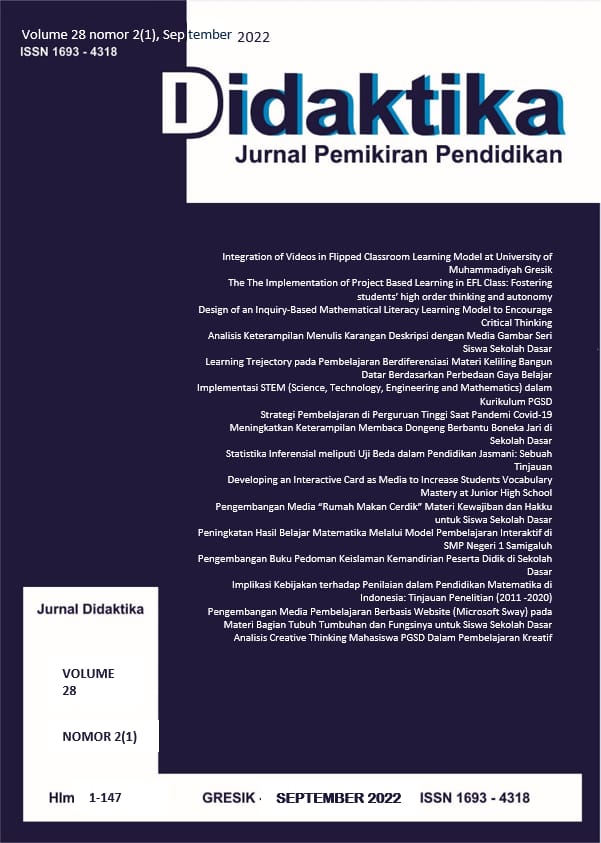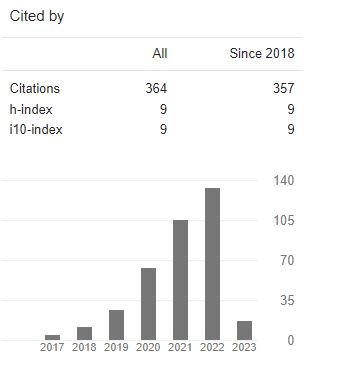Pengembangan Media “Rumah Makan Cerdik” Materi Kewajiban dan Hakku untuk Siswa Sekolah Dasar
Abstract
Penelitian ini dilatarbelakangi hasil pengamatan di SDN 1 Mlandangan, saat peneliti sedang observasi di SD tersebut. Pada saat itu guru hanya menggunakan metode ceramah saja dan suasana kelas menjadi kurang kondusif, ada beberapa siswa yang tidak memperhatikan guru saat menjelaskan materi, siswa ramai sendiri, pada saat siswa diberi soal atau pertanyaan kepada guru ada beberapa siswa yang tidak bisa menjawab soal dari guru tersebut. Akibatnya siswa tidak memahami materi yang telah disampaikan sehingga motivasi dan hasil belajaranya rendah. Penelitian menggunakan metode RND ( Research and Development) meliputi Anilisis, Desain, Pengembangan, Implementasi, Evaluasi. Kemudian peneliti membuat pengembangan media yaitu pengembangan media rumah makan cerdik, pada tema 4 kewajiban dan hakku. Hasil penelitian ini adalah 1) Melalui penerapan pengembangan media pada Sekolah dasar dapat menumbuhkan motivasi dan semngat belajar siswa pada kelas 3 SDN 1 Mlandangan. 2) Hasil kevalidan menunjukan validasi materi 86% sedangkan ahli media menunjukkan 88% 3) Hasil Kepraktisan menunjukkan presentase 94 % yang diisi oleh guru kelas III 4) Dari hasil posttest yang menunjukkan keefektifan menunjukkan ketuntasan secara klasikal yaitu sebesar 90 % dari 11 siswa.
Downloads

This work is licensed under a Creative Commons Attribution-NonCommercial 4.0 International License.
License and Copyright Agreement
In submitting the manuscript to the journal, the authors certify that:
- They are authorized by their co-authors to enter into these arrangements.
- The work described has not been formally published before, except in the form of an abstract or as part of a published lecture, review, thesis, or overlay journal.
- That it is not under consideration for publication elsewhere,
- That its publication has been approved by all the author(s) and by the responsible authorities – tacitly or explicitly – of the institutes where the work has been carried out.
- They secure the right to reproduce any material that has already been published or copyrighted elsewhere.
- They agree to the following license and copyright agreement.
Copyright
Authors who publish with DIDAKTIKA: Jurnal Pemikiran Pendidikan agree to the following terms:
- Authors retain copyright and grant the journal right of first publication with the work simultaneously licensed under a Creative Commons Attribution License (CC BY-SA 4.0) that allows others to share the work with an acknowledgment of the work's authorship and initial publication in this journal.
- Authors are able to enter into separate, additional contractual arrangements for the non-exclusive distribution of the journal's published version of the work (e.g., post it to an institutional repository or publish it in a book), with an acknowledgment of its initial publication in this journal.
- Authors are permitted and encouraged to post their work online (e.g., in institutional repositories or on their website) prior to and during the submission process, as it can lead to productive exchanges, as well as earlier and greater citation of published work.
Licensing for Data Publication
Open Data and Software Publishing and Sharing
The journal strives to maximize the replicability of the research published in it. Authors are thus required to share all data, code or protocols underlying the research reported in their articles. Exceptions are permitted but have to be justified in a written public statement accompanying the article.
Datasets and software should be deposited and permanently archived inappropriate, trusted, general, or domain-specific repositories (please consult http://service.re3data.org and/or software repositories such as GitHub, GitLab, Bioinformatics.org, or equivalent). The associated persistent identifiers (e.g. DOI, or others) of the dataset(s) must be included in the data or software resources section of the article. Reference(s) to datasets and software should also be included in the reference list of the article with DOIs (where available). Where no domain-specific data repository exists, authors should deposit their datasets in a general repository such as ZENODO, Dryad, Dataverse, or others.
Small data may also be published as data files or packages supplementary to a research article, however, the authors should prefer in all cases a deposition in data repositories.













